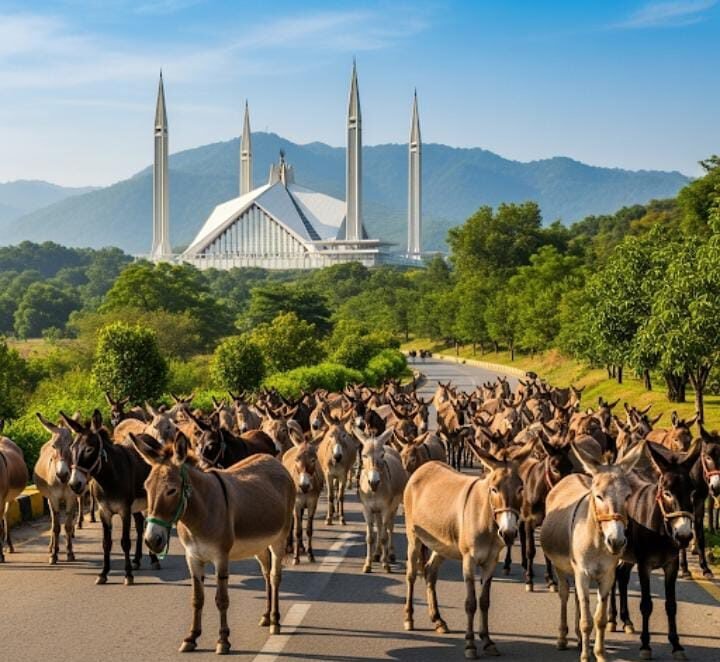In a startling revelation, a Senate Panel Reveals No Donkey Meat Testing in Pakistan— a disclosure that has sparked outrage among lawmakers, health experts, and citizens worried about food safety.
The absence of such testing facilities exposes major flaws in Pakistan’s food safety system, raising fears that adulterated and even illegal meat may be reaching consumers undetected.
Senate Briefing Raises Alarm
The disclosure came during a meeting of the Senate Standing Committee on Science and Technology. Officials admitted there are no labs, no standard procedures, and no regulatory framework to check whether donkey meat is entering the food supply chain.
Lawmakers were visibly shocked, pointing out that donkey meat scandals have repeatedly surfaced in cities like Lahore, Karachi, and Faisalabad. Despite years of public outrage, little progress has been made to prevent the problem.
Why It Matters
Food safety is directly tied to public health, consumer trust, and Pakistan’s reputation as a meat-exporting country.
- For millions of Muslims, donkey meat is non-halal, making its sale a religious violation.
- Health experts warn it could also pose serious health risks, as donkeys are not bred for human consumption and may carry harmful diseases.
- On an economic level, consumers are cheated, paying high prices for beef or mutton while unknowingly getting donkey meat.
If international buyers detect adulteration, Pakistan’s meat export industry could also face severe setbacks.
Donkey Meat Scandals in Pakistan
Over the past decade, multiple police raids have uncovered illegal networks supplying donkey meat disguised as beef or mutton. In several cases, authorities seized truckloads of donkey hides, raising suspicions of mass slaughter.
But without a testing system, it has been nearly impossible to measure the true scale of the problem or punish those responsible.
How Other Countries Handle Meat Testing
Across the world, countries have built strong systems to prevent meat fraud:
- European Union: Strict labeling laws and random DNA testing.
- China: Introduced high-tech meat authentication after scandals involving donkey and horse meat.
- Middle East: Uses rigorous halal testing before imported meat hits markets.
Compared to these, Pakistan is far behind in technology and regulation, leaving its consumers vulnerable.
Public Health Concerns
Doctors warn that eating donkey meat can be dangerous. Since donkeys are not raised for consumption, they may carry diseases or be treated with medicines unsafe for humans. Poor slaughtering practices further increase the chances of contamination.X
Religious scholars add that its sale under false labels is not just a health issue but also a religious and ethical violation.
Economic Exploitation of Consumers
The issue isn’t only about health — it’s also about money. Unsuspecting buyers are charged premium rates for what they believe to be quality meat, but often end up with adulterated, inferior, or even banned products.
Butchers exploit the loophole: with no labs to test meat, they operate without fear of being caught.
What Lawmakers Want
The Senate panel has urged the government to act immediately. Proposed measures include:
- Setting up meat testing labs at federal and provincial levels.
- Developing rapid test kits for use in local markets.
- Imposing strict penalties on offenders.
- Running awareness campaigns to guide consumers on buying safe meat.
If implemented, these steps could restore trust in local markets and protect public health.
Science and Technology: The Way Forward
Experts say Pakistan can easily adopt global solutions such as DNA barcoding and PCR testing, which are highly accurate in identifying meat sources. read next https://elevenpakistan.com/pakistan-stock-market-crosses-150000-points/
While the cost of setting up labs may seem high, experts argue it would be far less than the economic and social damage caused by unchecked food fraud.
Public Reaction
The revelation has gone viral on social media, with citizens expressing anger and disappointment. Many are asking why Pakistan has failed to set up even basic safeguards despite years of scandals.
Consumer rights groups are now demanding both accountability and urgent reforms, calling this a “wake-up call” for authorities.
Conclusion
The Senate’s disclosure that Pakistan has no system to test for donkey meat highlights a glaring failure in the country’s food safety framework.
Until proper labs, strict regulations, and regular inspections are in place, Pakistani consumers remain at risk — not just of being cheated financially, but of serious health and religious violations.
The revelation should serve as a turning point. Whether authorities act now will decide if Pakistan can restore trust in its meat markets — or let the shadow of adulterated meat continue to haunt consumers.
READ MORE



